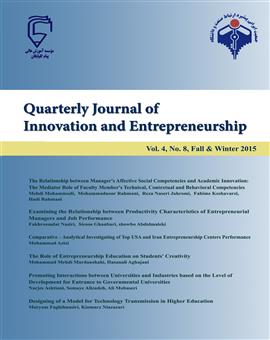Applying data mining techniques to regions segmentation for entrance exams to governmental universities
Subject Areas : تخصصینرجس سرعتی آَشتیانی 1 * , somayyeh alizadeh 2 , علی مبصّـری 3
1 -
2 -
3 -
Keywords: Data mining, cluster analysis, prediction, level of development, regions segmentation,
Abstract :
The large numbers of Iranian high school graduates are willing to enter in governmental and popular colleges and compete for it. On the other hand, these graduate students are from various regions with different levels of access to facilities. In opinion of directors of relevant agencies, the quota allocation solves this problem and they are looking to use the knowledge hidden in the data are available in this area.By this way volunteers from each region are compared together and managers are helped to allocate proper quota to related students in regions of each segment. In recent years, quota allocation was determined by Taxonomy that its result is a kind of ranking that does not allow group analyzing and identifies number of region theoretically. To solve this problem clustering is a good strategy. This study is carried out by using data mining techniques and Crisp methods on related dataset from education ministry, interior ministry, ministry of health, and center of statistic and evaluation organization for the first time. After extracting of effective attributes in this area, data preparation, data reduction and combination of attributes using Factor Analysis have done.in next step, by using K-means algorithm, similar items assign in to a cluster that has the minimum distance with centroid mean and then by using neural networks and decision trees, new item can be devoted to each cluster. Finally for assessing created models, accuracy of outputs compared with other methods. Outcomes of this research are: determining the optimal number of sectors, segmenting regions, analyzing each section, extracting decision rules, predicting class labels for new areas faster and more accurately, allowing the appropriate strategies formulation for each section

